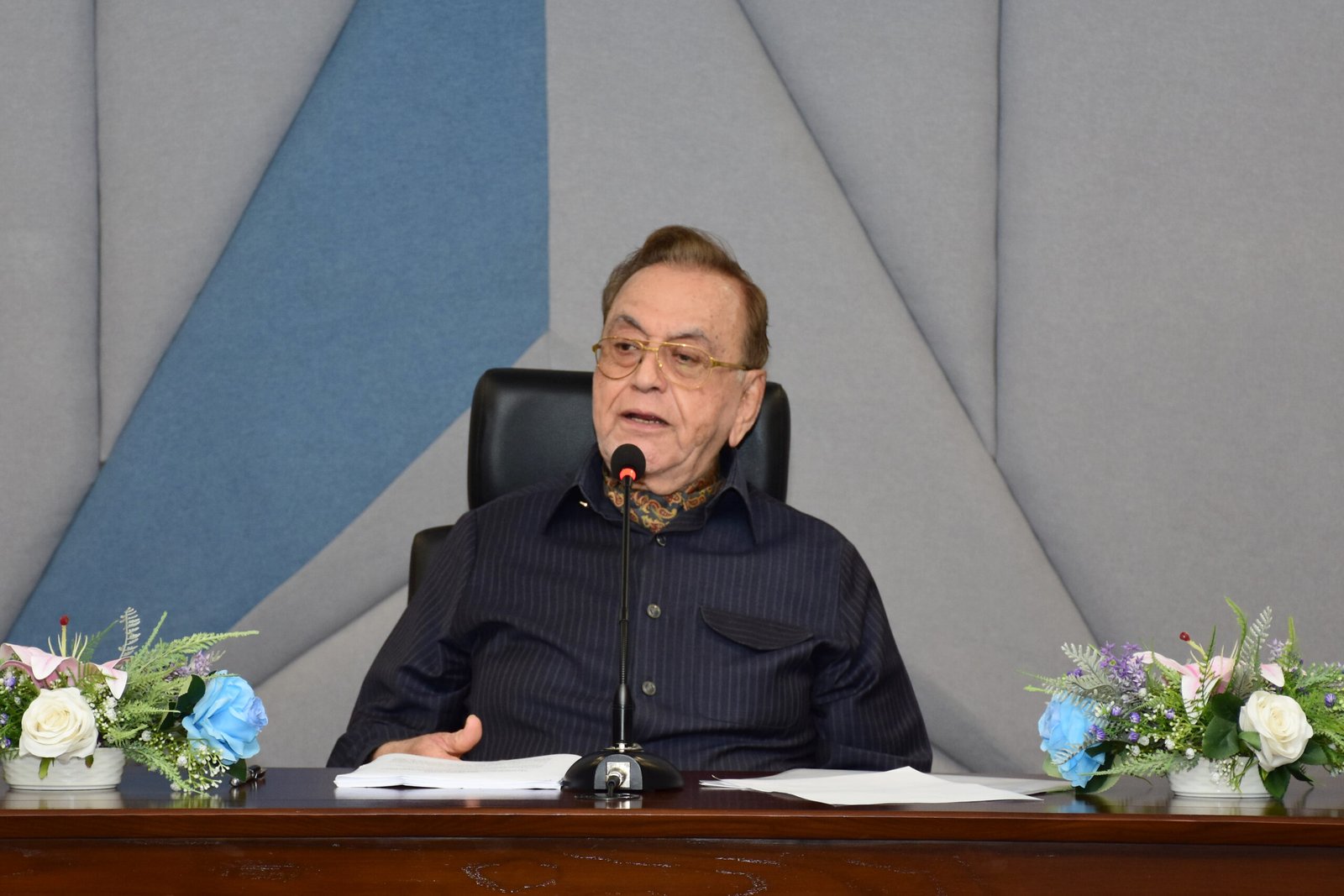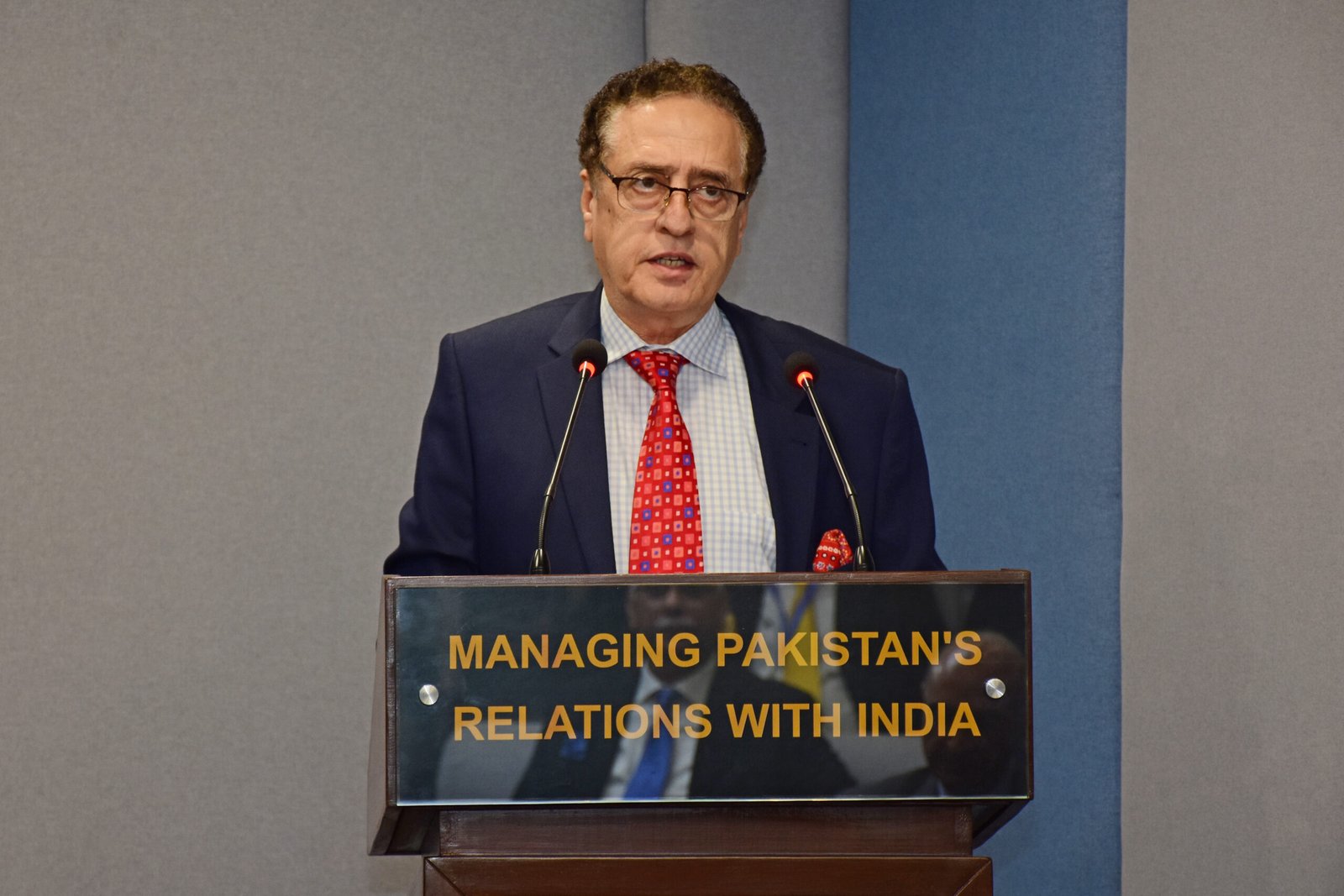
Managing Pakistan’s Relations with India
June 8, 2023
PRESIDENT
Air Marshal Asim Suleiman (Retd)
SEMINAR COORDINATOR
Ambassador (Retd) Muhammad Haroon Shaukat
MASTER OF CEREMONY
Nida Rehman Khattak
Executive Summary
A seminar on “Managing Pakistan’s Relations with India” was organised by the Centre for Aerospace and Security Studies (CASS), Lahore on 8 June 2023. The seminar was arranged keeping in view the existing stalemate in the bilateral relations between Pakistan and India. The seminar featured a keynote address by the former Foreign Minister of Pakistan, Mr. Khurshid Mahmud Kasuri, followed by an extensive Q&A session. President CASS, Air Marshal Asim Suleiman (Retd) made the concluding remarks while summing up the recommendations.
In his introductory remarks, Ambassador (Retd) Muhammad Haroon Shaukat, Director Foreign Affairs CASS Lahore, gave a brief overview of historical perspective of the bilateral relations between Pakistan and India. He shed light on the hardening of India’s stance towards Pakistan under BJP, especially since 2014 when Mr. Narendra Modi became the Prime Minister. Pakistan had to downgrade the bilateral relations following India’s illegal and unilateral annexation of the Indian Illegally Occupied Jammu and Kashmir (IIOJK) on 5 August 2019. He drew attention to India’s new role as a linchpin to the US strategy on Indo-Pacific, aimed primarily to contain and encircle China. This had led to a deepening of security and economic ties between India and the US, with obvious implications for Pakistan.
Reviewing the options available to Pakistan, he underscored that Pakistan desired a relationship with India based on sovereign equality, mutual respect, and peaceful settlement of disputes, especially a just settlement of the Jammu and Kashmir dispute. However, currently, there was an impasse in bilateral relations with India. He then raised a number of questions to open a broad canvas for deliberations in the seminar.
Former Foreign Minister Mr. Khurshid Mahmud Kasuri gave a comprehensive presentation on Pakistan-India relations, based on his first-hand experience as the former Foreign Minister (2003-2007) and his subsequent contacts with Indian leaders, senior diplomats and opinion makers within the framework of think tanks and backchannel diplomacy in New Delhi, UAE and London. He asserted that it was in India’s interest to have good relations with Pakistan and likewise it was in Pakistan’s interest to have good relations with India. A climate of tension and hostility did not suit either of the two.
With regard to the possible resolution of the Jammu and Kashmir dispute, Mr. Kasuri affirmed that every Head of State and Government in Pakistan, right from the beginning, was compelled to think out of the box while referring at the same time to United Nations Security Council resolutions. This, he added, was also true of the Indian leaders, who despite all sorts of tall claims found it in their own interest to talk to Pakistan. The politicians pander to their domestic constituencies when in opposition but are compelled to take a practical view when in power.
The former Foreign Minister believed that the ‘Four Point Proposal’ was still relevant, adding that his book “Neither a Hawk nor a Dove” provided the only authentic account of backchannel negotiations from 2003-2007, when according to him, a solution of Kashmir issue was within grasp of the two countries. Mr. Kasuri claimed that his book contained the confirmed account of backchannel talks on the Four Point Formula, as advance copies of the book were sent to President Musharraf, Prime Minister Manmohan Singh and opposition leader LK Advani. They all attended the inauguration of his book launches in Karachi and in New Delhi. “They would never have come if they had felt that I had lied or misrepresented.” He added, “I believe in diplomacy as in life. Lies kill everything.”
At the same time, he acknowledged that he came under a lot of criticism from some retired ambassadors, generals and think tanks, “who do not have to deal with the situation on the ground.” Mr. Kasuri remarked that Lambah’s recently launched book In Pursuit of Peace: India-Pakistan Relations Under Six Prime Ministers vindicates his position. He emphasised that Modi, though not a lover of Pakistan or Muslims, found it necessary to talk to Pakistan, through an emissary, as late as 2017, as corroborated by a leading Indian journalist Suhasni Haider. Lambah confirmed that “there appeared to be an intent to continue the backchannel”.
Referring to 5 August 2019 illegal actions of Mr. Narendra Modi, Mr. Kasuri affirmed that “the idea of Kashmir is alive because of the freedom struggle by the Kashmiris. The issue will never be settled if Pakistan is not involved in it.”
On Operation Swift Retort, Mr. Kasuri remarked, before the operation, there was a lot of pressure on Pakistan government to show restraint but peace should never come out of weakness. It was important for Pakistan to show its strength. India lost two aircraft and one Indian pilot was taken captive.
The former Foreign Minister stated that today India is seen as strong economically, but only three years ago it was regarded as a failing state as it could not cope with corona pandemic and had 4.5 million deaths. He expressed the hope that Pakistan will soon experience a positive turn around.
Air Marshal Asim Suleiman (Retd), President CASS Lahore, in his concluding remarks, briefly dwelt upon the history of adversarial relations between the two countries, mainly due to the unresolved Jammu and Kashmir dispute. He felt that unfortunately deep mistrust continued to plague the relationship between both nations. He also gave an overview of painful events of the creation of the two countries, with approximately 17 million people migrating amid significant violence and abuse and traced the chequered history of conflict and dialogue over the past 75 years.
He observed that in August 2019, India violated UNSC resolutions and repealed Article 370 and 35A of the Indian constitution. India thus annexed the occupied territory and has been forcibly altering the demographics of the occupied valley. As a result, Pakistan downgraded diplomatic ties and stopped bilateral trade.
At the end of his concluding remarks, the President CASS enunciated that the reality of Pakistan-India relations is that of a history of lost opportunities. Trust deficit and domestic constituencies have played a negative role. He concluded by stating that a visionary leadership was required on both sides to take a flexible and focused approach.
Guest Speakers

Mr. Khurshid Mahmud Kasuri
Former Foreign Minister of Pakistan
CASS Speakers

Ambassador (Retd) Muhammad Haroon Shaukat
Director Foreign Affairs, CASS Lahore

Air Marshal Asim Suleiman (Retd)
President, CASS Lahore
CASS LAhore

The Centre for Aerospace & Security Studies (CASS) was established in July 2021 to inform policymakers and the public about issues related to aerospace and security from an independent, non-partisan and future-centric analytical lens.


